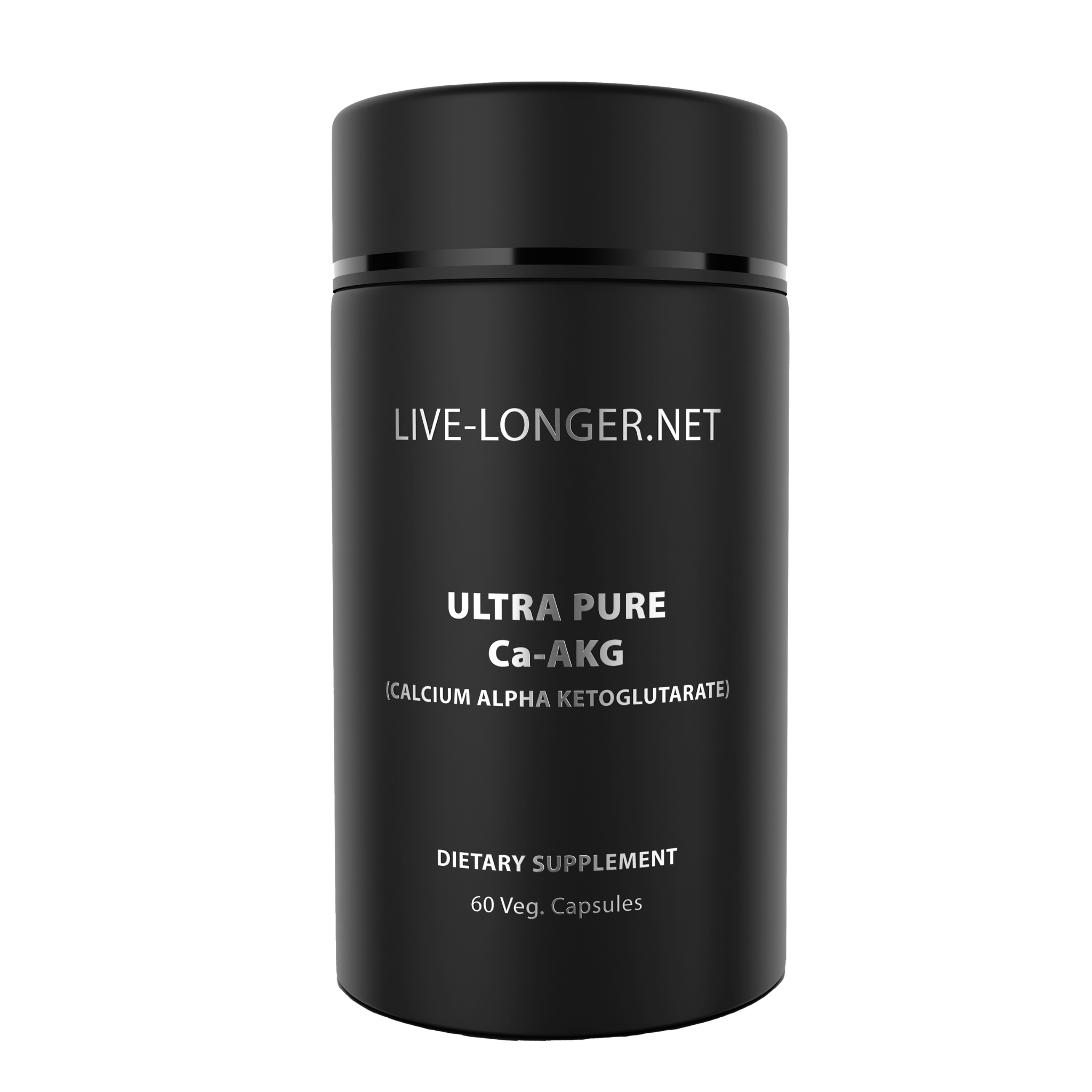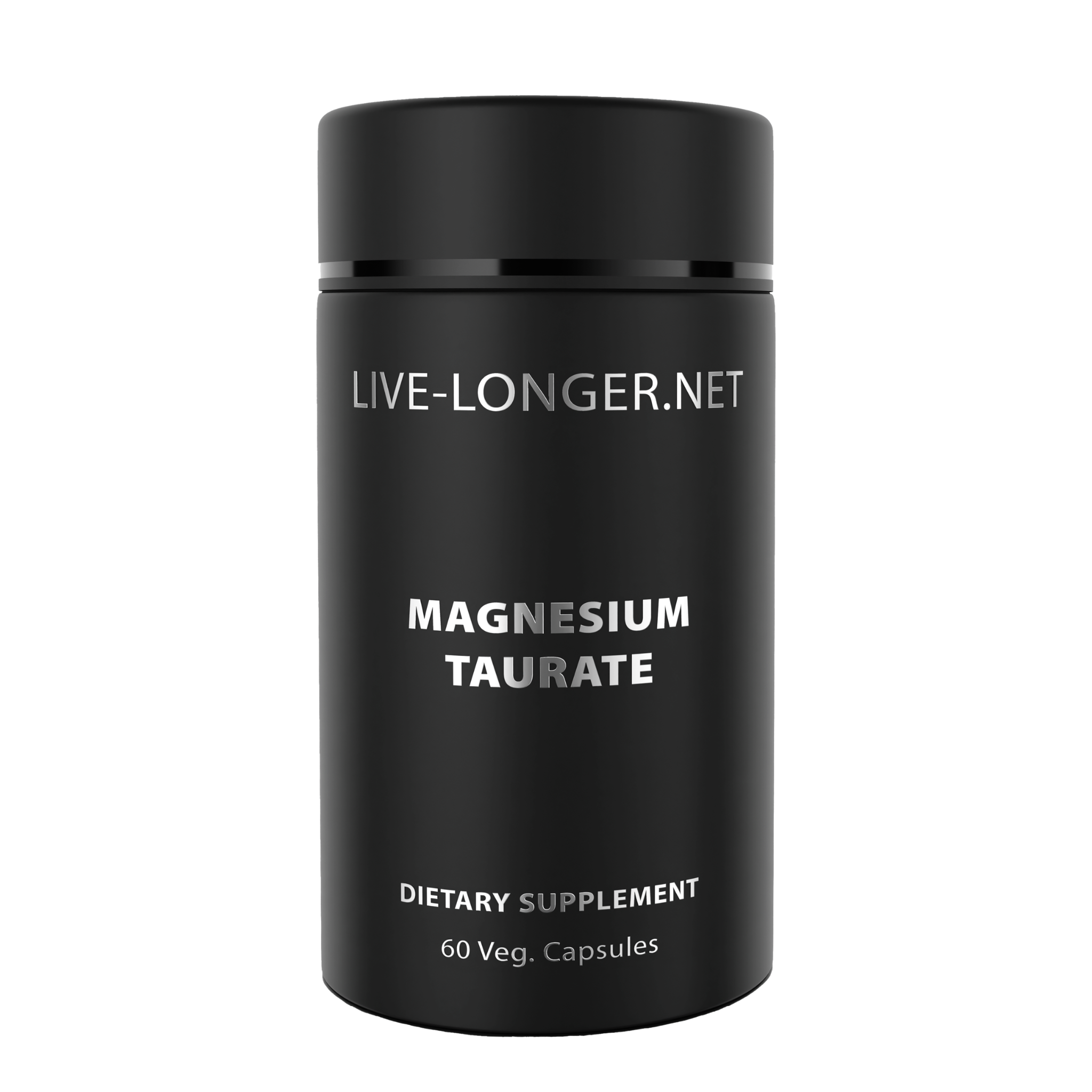Reverse Aging with Ca-AKG: An Anti-Aging Breakthrough
Introduction
Aging is an inevitable reality of human lives. But what if we tell you that you can literally put a stop to the timepiece and even reverse aging? Yes, it is possible! You can literally slow down your aging process and live longer.
Recently, there's been hype about calcium-alpha ketoglutarate (Ca-AKG) and its incredible effect to reverse aging. These aren't mere talks; research studies have confirmed that regular use of Ca-AKG supplements can reverse your biological age by eight years on average [1].
In this blog, we will look at the specifics of how Ca-AKG supplements work to reverse aging! So, without further delay, let's find out!
What is Ca-AKG?
Ca-AKG stands for Calcium - Alpha Ketoglutarate.
AKG is an important molecule in the body. It plays a significant role in biological processes, such as the Krebs Cycle – the process by which our body produces energy.
Your body works like a machinery and of course, it will need some kind of fuel to run smoothly. Alpha Ketoglutarate is a molecule that helps make body's energy fuel. This fuel helps the body make more proteins and copy DNA material, and look for any genetic error causing illnesses like cancer. That's a marvelous job.
But as we get older, our body doesn't make as much AKG, so it's like the fuel for our machine starts running low. That's not good because our body needs enough fuel to stay healthy.
Unfortunately, as we age, there's a significant decline in AKG levels, dropping by approximately tenfold between the ages of 40 and 80 [2].
AKG is an endogenous compound, meaning it is produced in the body during the Krebs cycle. We cannot achieve desirable levels through diet alone. However, researchers say that fasting regularly and following a keto diet can help to restore natural levels of AKG [2].
However, the optimal choice would be taking an over-the-counter Ca-AKG supplement to restore your normal AKG levels. Calcium alpha-ketoglutarate is more slowly absorbed in the gut and released into the bloodstream, so it can work for longer in the body.
Required Dose: We recommend 1600 mg of Ca-AKG per day, which is higher than what other recommend but it is generally found more effective than lower dosages.
How Can Ca-AKG Help You in Reverse Aging?
First, let's establish one fact: Your actual age is not the number of years you have lived on the face of this planet. In fact, the number of years lived is just the chronological age. Your actual age is your biological age, which is determined by the changes in your DNA and other body changes that occur with each passing year.
So, when we say, "You can reverse your age with Ca-AKG," we mean your biological age.
As we age, the cells and tissues of the body also age. The mitochondria of the cells are impaired, and more DNA damage occurs in the cells. Mitochondria is the powerhouse of the cell. Any disruption in its functioning can reduce the normal functioning of a cell [3].
Alpha-ketoglutarate plays a role in various cellular processes and prevents aging. When acting in a Krebs cycle, AKG provides glutamine and glutamate amino acids, which promote protein synthesis. [4]. More protein synthesis means more muscle building.
Another important thing about AKG is its role in the destruction of alpha-synuclein proteins. These proteins are normally involved in transmitting nerve signals in the brain. However, with age, there is an increased synthesis and, consequently, accumulation of alpha-synuclein (AS) proteins in the brain. This accumulation of AS proteins has been associated with Parkinson's disease [5]. Alpha-ketoglutarate supplements decrease AS levels and prevent neurotoxicity [6]. Thus, AKG also prevents the occurrence of Parkinson's disease.
Here are the 5 Potential Benefits of Ca-AKG
If you're looking for a more natural way to reverse aging and live healthily, Ca-AKG is an option. Here are some potential benefits of Ca-AKG:
1. Improves Bone Density
Osteoporosis is a common complaint among the elderly population. In this condition, bone mass formation is reduced, and there is significant degradation of already formed bone.
Although various therapies like bisphosphonates and PTH regulators are used as medical drugs to treat osteoporosis, long-term use of these drugs has been associated with serious side effects like osteonecrosis of jaw bone or gastrointestinal disturbances [7].
Previous research suggests that alpha-ketoglutarate (AKG) holds promise in preventing bone loss and enhancing bone strength. Studies in rats and lambs demonstrated that AKG promotes bone development, while in worms, it delayed the decline in coordinated movement [8] [9]. Furthermore, AKG was found to play a crucial role in maintaining the pluripotency of embryonic stem cells [10]. These pluripotent cells can potentially form any type of cell in the body, especially those that need to be repaired.
2. Protects Against Organ Damage
The major cause of organ damage in the body is the impairment of vascular endothelial function, which leads to tissue hypoxia. An exaggerated response by a cytokine storm triggers these changes.
Cytokines are the pro-inflammatory molecules that are involved in the destruction of tissues in two steps:
- Increasing the production of reactive oxidation species
- Damaging the endothelial walls of microvessels
Both these steps ultimately lead to decreased blood supply to the tissues, resulting in organ damage.
Aging has been associated with chronic inflammation and a constant release of these cytokines. Studies have found that Ca-AKG supplements can potentially reduce the inflammation-inducing cytokines in the body [11].
In another trial, researchers injected AKG in 18-month-old mice and found a significant decrease in pro-inflammatory molecules like cytokines and tissue necrosis factor alpha (TNF-a). The researchers also observe a 12% increase in the lifespan of mice. The study concluded that AKG can potentially reduce levels of inflammatory molecules and promote a longer and healthier lifespan [2].
3. Increases Energy by Supporting The Krebs Cycle
The Krebs cycle, or the citric acid cycle, is an important biological process in our body. It is mainly involved in producing ATP by utilizing FADH2 and NADH. ATP is our body's energy currency. The more ATP produced, the more energetic we are.
Ca-AKG plays a vital role in cellular respiration by actively participating in the Krebs cycle [12]. It helps convert the food into energy, which is necessary for various cellular activities, including cell replication, muscle contraction, and maintaining cellular structure.
4. Protects Against Stem Cells Aging
Stem cells are special cells found in adults. These cells are important for growing, repairing, and renewing body tissues. Stem cells can make more of themselves (self-renewal) or change into different cell types (differentiation).
However, as we age, the number of stem cells and their functioning decline, affecting our organs and leading to health issues [13].
Surprisingly, AKG has been shown to regulate stem cell growth and specialization, offering a potential strategy to enhance lifespan and overall health. A study discovered that higher levels of α-ketoglutarate (αKG) in humans speed up the process of stem cells transforming into different cell types. In contrast, increased levels of another substance called succinate slow down this process [14]. It appears that αKG influences specific enzymes within the cell, determining whether the stem cells maintain their current state or transform into a different cell type.
5. Improves Gut Health
In recent years, doctors have seen a surge in patients with gastrointestinal disturbances. It may be partly because of the high prevalence of stress and a sedentary lifestyle. However, taking care of gut health has become more important than ever.
A clinical trial on mice was performed when they were fed a protein-free diet with AKG supplementation for 14 days. The researchers discovered that the mice showed normal growth even though they did not consume any protein. Moreover, there was no obvious intestinal damage in those mice. This study concluded that AKG supplements have anti-catabolic properties, which prevent tissue breakdown in the body [15].
Moreover, alpha-ketoglutarate helps make glutamine, which is good for your health in many ways [16]
- It maintains cellular homeostasis.
- It helps synthesize proteins.
- It is involved in the metabolism of fats.
- It is also involved in the secretion of insulin.
In particular, glutamine helps keep your gut bacteria balanced, strengthens the lining of your intestines, and fights inflammation. All of this helps your digestive system work better.
It means you can absorb and use nutrients like carbs, proteins, vitamins, and minerals better, which can help you stay healthy as you age.
The Bottom Line
Reverse aging is something everybody dreams of at least once in life. And Ca-AKG supplements can make this dream come true. Therefore, if you want to enjoy your 70s, like your 30s, take AKG supplements regularly. While AKG supplements can act on cellular level and reverse your age, adopting an active lifestyle is always a good idea to live healthier. Shop our all products to find the right supplements for you.
References
- Demidenko, O., Barardo, D., Budovskii, V., Finnemore, R., Palmer, F. R., Kennedy, B. K., & Budovskaya, Y. V. (2021). REJUVANT®, a potential life-extending compound formulation with alpha-ketoglutarate and vitamins, conferred an average eight year reduction in biological aging, after an average of 7 months of use, in the truage DNA methylation test. Aging, 13(22), 24485–24499.
- Asadi Shahmirzadi, A., Edgar, D., Liao, C. Y., Hsu, Y. M., Lucanic, M., Asadi Shahmirzadi, A., Wiley, C. D., Gan, G., Kim, D. E., Kasler, H. G., Kuehnemann, C., Kaplowitz, B., Bhaumik, D., Riley, R. R., Kennedy, B. K., & Lithgow, G. J. (2020). Alpha-Ketoglutarate, an Endogenous Metabolite, Extends Lifespan and Compresses Morbidity in Aging Mice. Cell metabolism, 32(3), 447–456.e6.
- InformedHealth.org [Internet]. Cologne, Germany: Institute for Quality and Efficiency in Health Care (IQWiG); 2006-. What happens when you age? 2020 Sep 10.
- Wu, N., Yang, M., Gaur, U., Xu, H., Yao, Y., & Li, D. (2016). Alpha-Ketoglutarate: Physiological Functions and Applications. Biomolecules & therapeutics, 24(1), 1–8.
- Stefanis L. (2012). α-Synuclein in Parkinson's disease. Cold Spring Harbor perspectives in medicine, 2(2), a009399.
- Zhang, W., Ding, L., Zhang, M., Zheng, S., Ma, R., Gong, J., Mao, H., Xu, H., Xu, P., & Zhang, Y. (2023). Dietary intake of α-ketoglutarate ameliorates α-synuclein pathology in mouse models of Parkinson's disease. Cellular and molecular life sciences : CMLS, 80(6), 155.
- Whitaker, M., Guo, J., Kehoe, T., & Benson, G. (2012). Bisphosphonates for osteoporosis--where do we go from here?. The New England journal of medicine, 366(22), 2048–2051.
- Dobrowolski, P., Tomaszewska, E., Bienko, M., Radzki, R. P., & Pierzynowski, S. G. (2013). The effect of dietary administration of 2-oxoglutaric acid on the cartilage and bone of growing rats. British journal of nutrition, 110(4), 651-658.
- Harrison, A. P., Tygesen, M. P., Sawa-Wojtanowicz, B., Husted, S., & Tatara, M. R. (2004). α-Ketoglutarate treatment early in postnatal life improves bone density in lambs at slaughter. Bone, 35(1), 204-209.
- Carey, B. W., Finley, L. W., Cross, J. R., Allis, C. D., & Thompson, C. B. (2015). Intracellular α-ketoglutarate maintains the pluripotency of embryonic stem cells. Nature, 518(7539), 413-416.
- He, L., Li, H., Huang, N., Zhou, X., Tian, J., Li, T., Wu, J., Tian, Y., Yin, Y., & Yao, K. (2017). Alpha-ketoglutarate suppresses the NF-κB-mediated inflammatory pathway and enhances the PXR-regulated detoxification pathway. Oncotarget, 8(61), 102974–102988.
- Zdzisińska, B., Żurek, A., & Kandefer-Szerszeń, M. (2017). Alpha-Ketoglutarate as a Molecule with Pleiotropic Activity: Well-Known and Novel Possibilities of Therapeutic Use. Archivum immunologiae et therapiae experimentalis, 65(1), 21–36.
- Ahmed, A. S., Sheng, M. H., Wasnik, S., Baylink, D. J., & Lau, K. W. (2017). Effect of aging on stem cells. World journal of experimental medicine, 7(1), 1–10.
- TeSlaa, T., Chaikovsky, A. C., Lipchina, I., Escobar, S. L., Hochedlinger, K., Huang, J., Graeber, T. G., Braas, D., & Teitell, M. A. (2016). Α-ketoglutarate accelerates the initial differentiation of primed human pluripotent stem cells. Cell Metabolism, 24(3), 485–493.
- Prandini, A., Morlacchini, M., Sigolo, S., Fiorentini, L., & Gallo, A. (2012). Anti Catabolic activity of alpha-ketoglutaric acid in growing rats. Italian Journal of Animal Science, 11(3), e52.
- Xiao, D., Zeng, L., Yao, K., Kong, X., Wu, G., & Yin, Y. (2016). The glutamine-alpha-ketoglutarate (AKG) metabolism and its nutritional implications. Amino acids, 48(9), 2067–2080.









